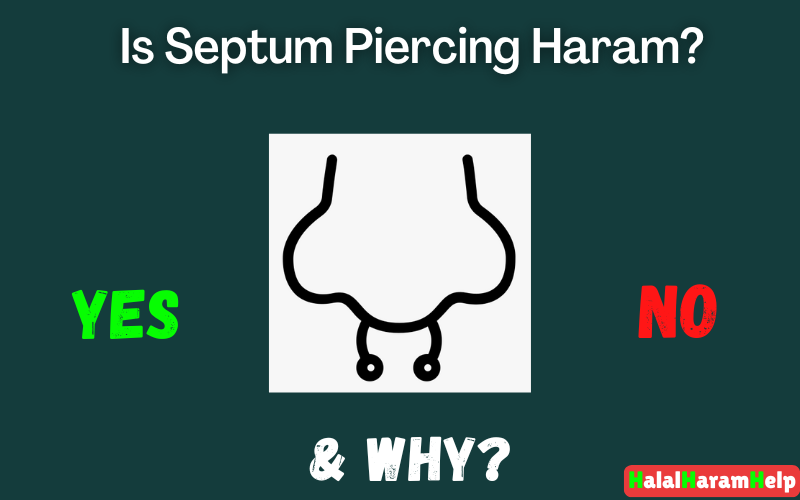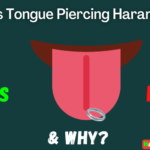Septum piercing has become a popular form of body modification, especially among young people.
However, for Muslims, the question of whether septum piercings are allowed often arises. In Islam, body modification is viewed with caution, and certain practices are prohibited due to the harm they can cause or their opposition to the teachings of Islam.
Septum piercing, like other forms of body alteration, is generally considered haram (forbidden) in Islam.
This article explores why septum piercing is deemed haram, the religious and health implications, and what alternatives are acceptable.

Why Is Septum Piercing Considered Haram?
There are several reasons why septum piercing is considered haram in Islam. At its core, Islam promotes the idea that the human body is a trust of Allah and should be maintained in its natural form.
Altering the body without a valid reason, especially through painful or harmful procedures, is discouraged in Islam.
Body Mutilation and Pain: Septum piercing involves creating a hole in the cartilage of the nose, which can lead to pain, inflammation, and potential complications like infection.
Islam prohibits unnecessary body mutilation, and piercing is seen as an alteration that goes against the natural state of the body.
The Prophet Muhammad (SAW) prohibited anything that involved causing harm or unnecessary pain to the body, making septum piercing contrary to these teachings.
Lack of Religious Basis: There is no mention of septum piercing in the Quran or Hadith, indicating that it is not an Islamic practice.
While some forms of body modification, such as ear and nose piercings, are mentioned or accepted, septum piercing does not have religious roots and is seen as a modern, non-Islamic trend.
Symbol of Arrogance and Pride: In Islam, the act of modifying one’s body for the sake of vanity or to attract attention can be seen as an expression of pride and arrogance, which are discouraged.
Septum piercings, especially when done for fashion or to stand out, can be interpreted as an act of self-centeredness or a desire to exhibit pride, which goes against the values of humility and modesty promoted in Islam.
Health Risks: From a health perspective, septum piercing carries the risk of infection, tissue damage, and long-term complications.
Improper aftercare, unclean equipment, or even the piercing itself can lead to scarring or permanent damage.
Since Islam emphasizes the importance of safeguarding one’s health, any practice that endangers it without necessity is discouraged.
You might also like to know is tongue piercing haram.
Is Septum Piercing Allowed For Women?
In some cases, women in certain cultures may have nose piercings as part of traditional adornment or beauty practices.
However, in Islam, the type of nose piercing that is permissible for women is typically restricted to a side nose piercing rather than a septum piercing. Side nose piercings are generally considered to be less intrusive and painful compared to septum piercings.
They are viewed as a form of beautification, which is permissible as long as it doesn’t cause harm or deface the body.
For men, any form of facial piercing, including septum piercings, is strictly haram. In Islam, men are advised to avoid any form of body modification that is considered feminine or contrary to the traditional image of masculinity.
Thus, septum piercings are not permissible for men, as it is seen as an act that goes against Islamic principles of modesty and gender distinctions.
Also see is ear piercing haram.
Health Implications Of Septum Piercing
Aside from religious concerns, septum piercings also carry potential health risks that should not be ignored. These risks can include:
Infections: If proper hygiene isn’t maintained, septum piercings are susceptible to infections, which can lead to swelling, redness, and even pus discharge. In severe cases, infections may spread, causing long-term damage to the cartilage in the nose.
Tissue Damage: The piercing itself can lead to tearing or other tissue damage, especially if the jewelry is too large or the piercing is done improperly. This damage can result in permanent scarring or disfigurement.
Breathing and Smell Issues: A septum piercing can obstruct airflow through the nostrils, which may affect breathing and reduce the sense of smell. For some, this temporary impairment can be a bothersome side effect.
Long-Term Effects: Over time, septum piercings may cause the cartilage to weaken or distort, leading to complications that may require corrective surgery. These potential long-term consequences further reinforce the idea that piercing for aesthetic purposes is unnecessary and harmful.
Alternatives To Septum Piercing In Islam
If you are considering body modification or want to express yourself through adornment in line with Islamic values, there are alternatives to septum piercing that are permissible.
For women, nose-side piercings and ear piercings are considered halal. These types of piercings are more traditional and are not seen as harmful or damaging to the body when done properly.
They are also considered acceptable forms of beautification in Islam, as long as they do not cause unnecessary pain or harm.
When opting for these piercings, it is important to ensure that they are performed by a certified and experienced professional, using clean and safe equipment to avoid any health complications.
Additionally, it is crucial to remember that the intention behind the piercing should be to enhance one’s natural beauty without vanity or pride.
Also learn is belly piercing haram.
Conclusion
In conclusion, septum piercing is considered haram in Islam due to its potential harm to the body, the unnecessary pain it causes, and the lack of any religious basis for the practice.
The teachings of Islam emphasize the preservation of the body in its natural state, and any form of body modification that involves mutilation or defacement is generally prohibited.
For Muslims, it is important to seek alternative forms of beautification that align with the principles of modesty, humility, and health.
Instead of following temporary trends like septum piercing, Muslims are encouraged to stay true to their faith and make choices that reflect their values and commitment to the teachings of Islam.


